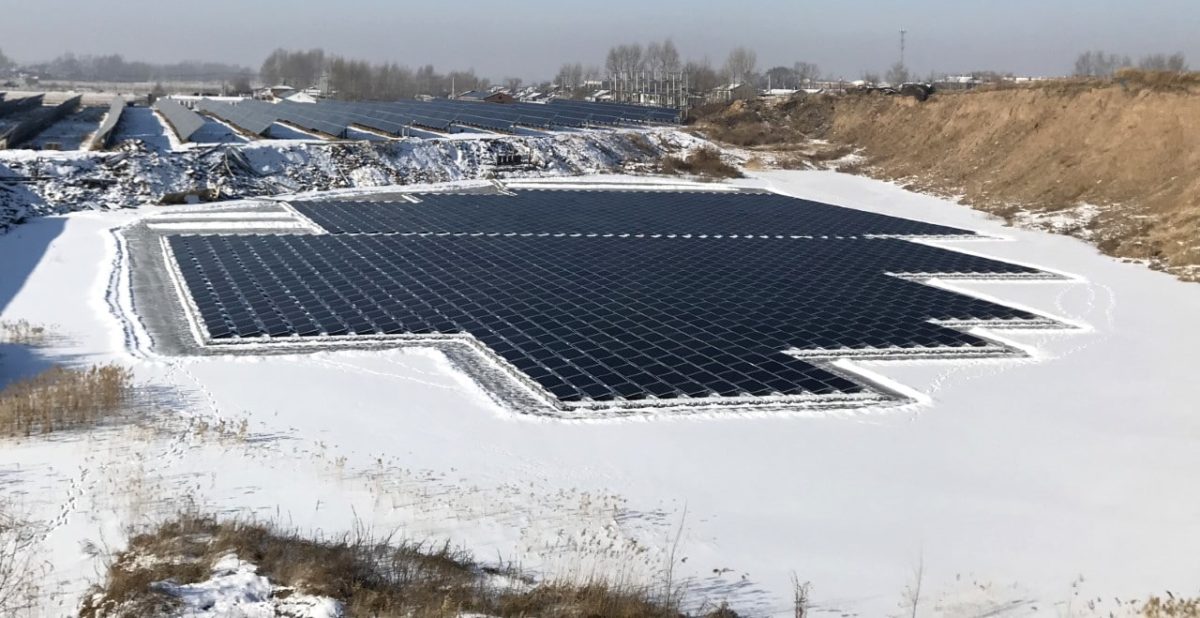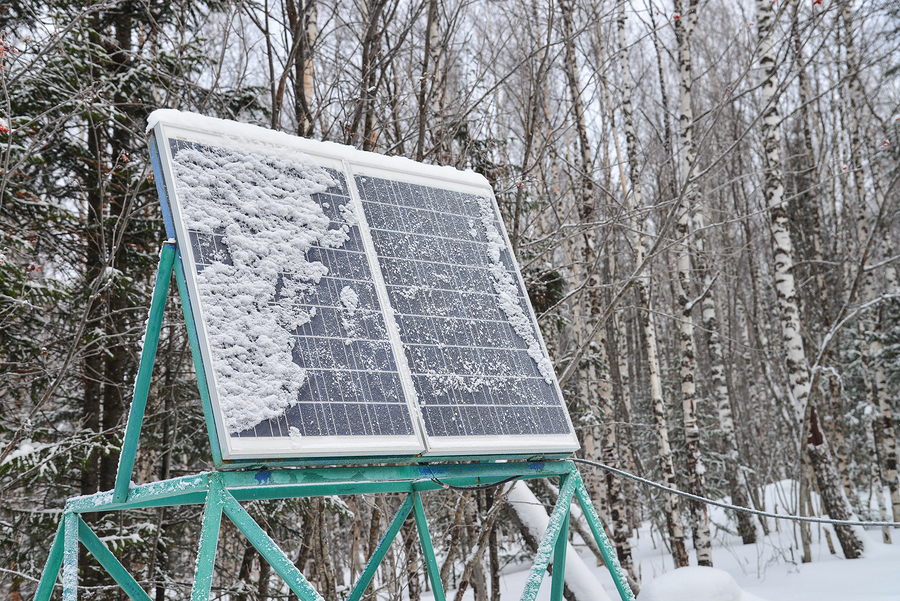When the temperature outside plummets, you might think your solar panels are in for a tough time. After all, ice and snow can damage other types of equipment. However, solar panels are built to withstand freezing temperatures.
In fact, they can actually produce electricity in cold weather.
Yes, solar panels can freeze. In fact, it’s not uncommon for solar panels to be covered in frost or even ice during winter weather.
However, this doesn’t mean that solar panels don’t work in cold weather.
In fact, solar panels are actually quite efficient in colder temperatures.
So, if you’re wondering if solar panels can still work when it’s cold outside, the answer is yes! Just make sure to keep an eye on the weather and keep your panels clean and free of debris.

Credit: www.pv-magazine.com
How Do I Keep My Solar Panels from Freezing?
Assuming you would like tips on how to prevent your solar panels from freezing:
One way to prevent your solar panels from freezing is to use an antifreeze solution. This can be created by mixing water and alcohol in a 1:1 ratio.
Another way to keep your solar panels from freezing is to install them in a way that allows for air circulation, such as on a roof. You can also use a solar panel cover to insulate your panels and prevent heat loss.
How Cold is Too Cold for Solar Panels?
When it comes to solar panels, there is no such thing as too cold. In fact, solar panels actually work more efficiently in cold weather than they do in hot weather. The reason for this is that the solar panels are able to absorb more sunlight in cold weather, which means that they are able to generate more electricity.
However, there are a few things to keep in mind if you live in a cold climate and are considering solar panels. First, you will want to make sure that your solar panels are properly insulated. This will help to prevent them from freezing and will also help to keep them from losing any heat that they generate.
Another thing to keep in mind is that solar panels can actually be damaged by the cold. If the solar panels are exposed to the cold for too long, they can crack and become damaged. This is why it is important to make sure that they are properly protected from the elements.
Overall, there is no such thing as too cold for solar panels. In fact, they actually work more efficiently in cold weather. Just make sure that you take the necessary precautions to keep them protected from the cold and you will be able to enjoy all of the benefits that solar power has to offer.
Does Cold Weather Affect Solar Panels?
When it comes to solar panels, cold weather can have an impact on their performance. In general, solar panels are designed to operate in a wide range of temperatures, from -40 degrees Fahrenheit to 185 degrees Fahrenheit. However, cold weather can affect the way solar panels generate electricity.
Solar panels work by absorbing sunlight and converting it into electrical energy. The amount of electricity that a solar panel can generate is directly related to the amount of sunlight it receives. In cold weather, the sun’s rays are not as strong, which means that solar panels will not be able to generate as much electricity.
However, it’s important to keep in mind that solar panels will still generate some electricity in cold weather, just not as much as they would in warm weather. So if you’re considering installing solar panels, don’t let the fear of cold weather deter you. Solar panels are a great way to save money on your energy bill, even in the winter.
Do Solar Panels Work If Covered in Ice?
Solar panels work by absorbing sunlight and converting it into electricity. Even if they are covered in ice, they will still be able to absorb some sunlight and generate electricity. However, the amount of electricity they generate will be reduced.
Solar Powered Fridge – How to Run a Fridge With and Without! Batteries
Do Solar Panels Work Covered in Ice
As you may know, solar panels are designed to absorb sunlight and convert it into electrical energy. But what happens when they’re covered in ice?
It’s actually not as bad as you might think.
The ice actually acts as an insulator, so it doesn’t affect the solar panels’ ability to absorb sunlight. In fact, the ice can actually help reflect sunlight and make the panels more efficient.
However, there are some caveats.
Solar panels covered in ice will be less efficient than normal, so it’s important to make sure they’re not your only source of power. And, of course, the ice will eventually melt, so you’ll need to clean off the panels to prevent any damage.
Overall, though, solar panels covered in ice is not a big deal.
In fact, it can actually be helpful! Just be sure to take some precautions and you’ll be fine.
Do Solar Panels Work in Cloudy Weather
Solar panels are designed to work in all weather conditions, including cloudy weather. In fact, solar panels actually work better in cooler weather because the solar cells are more efficient when they are cooler. However, solar panels will still produce electricity on cloudy days, just not as much as on sunny days.
Heated Solar Panels
As the name implies, heated solar panels are a type of solar panel that uses heat to generate electricity. The way they work is by using a material that is good at absorbing and storing heat, like a metal, to absorb the sun’s heat. This heat is then used to generate electricity through a process called the Seebeck effect.
Heated solar panels have a few advantages over traditional solar panels. First, they can be used to generate electricity even on cloudy days or in low-light conditions, because they don’t rely on sunlight to generate electricity. Second, they’re more efficient than traditional solar panels, meaning they can generate more electricity per square foot.
However, heated solar panels also have a few disadvantages. First, they’re more expensive than traditional solar panels. Second, they require more maintenance, because the material that absorbs and stores heat needs to be replaced periodically.
If you’re considering installing solar panels, heated solar panels are a great option. They’re more efficient than traditional solar panels and can generate electricity even on cloudy days. However, they’re also more expensive and require more maintenance.
Best Solar Panels for Winter Use
As the winter season approaches, many people are looking for ways to reduce their energy costs. One way to do this is to install solar panels. Solar panels are a great way to generate electricity, especially during the winter months when the sun is not as strong.
There are a few things to consider when choosing the best solar panels for winter use. The first is the type of solar panel. There are two main types of solar panels: monocrystalline and polycrystalline.
Monocrystalline panels are made from a single crystal of silicon, while polycrystalline panels are made from multiple crystals of silicon.
Monocrystalline panels are more efficient than polycrystalline panels, but they are also more expensive. If you are looking for the most efficient solar panel, then monocrystalline is the way to go.
However, if you are on a budget, then polycrystalline panels will still be able to provide you with some electricity.
The second thing to consider is the size of the solar panel. The larger the solar panel, the more electricity it will be able to generate.
If you have a large roof, then you will want to get a large solar panel. However, if you have a small roof, then you can get away with a smaller solar panel.
The third thing to consider is the angle of the solar panel.
The angle of the panel will affect how much electricity it produces. If you live in an area with a lot of sun, then you will want to get a solar panel that is angled towards the sun. However, if you live in an area with less sun, then you will want to get a solar panel that is angled away from the sun.
These are just a few things to keep in mind when choosing the best solar panels for winter use. If you take the time to research the different options, then you should be able to find the perfect solar panel for your needs.
Conclusion
Solar panels can freeze, but it’s not a common occurrence. The most likely time for this to happen is during a cold snap, when the temperature dips below freezing for an extended period of time. If the panels are covered in snow, ice, or debris, this can also insulate them and cause them to freeze.
In most cases, the panels will thaw out on their own as the sun comes back out and warms them up. However, if the panels are damaged from the freezing, they may need to be replaced.
